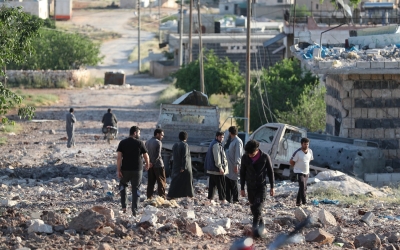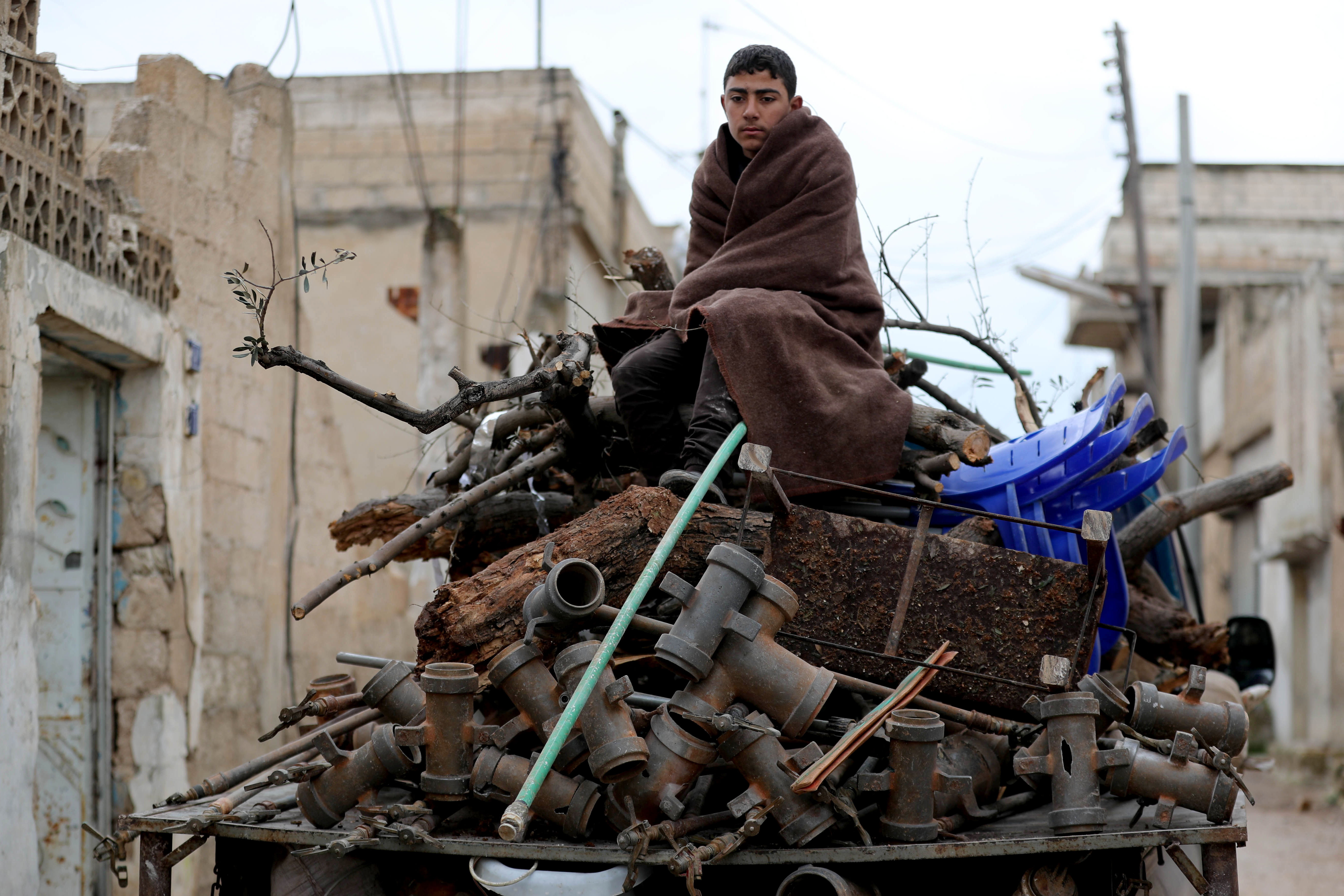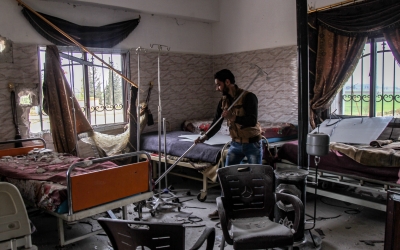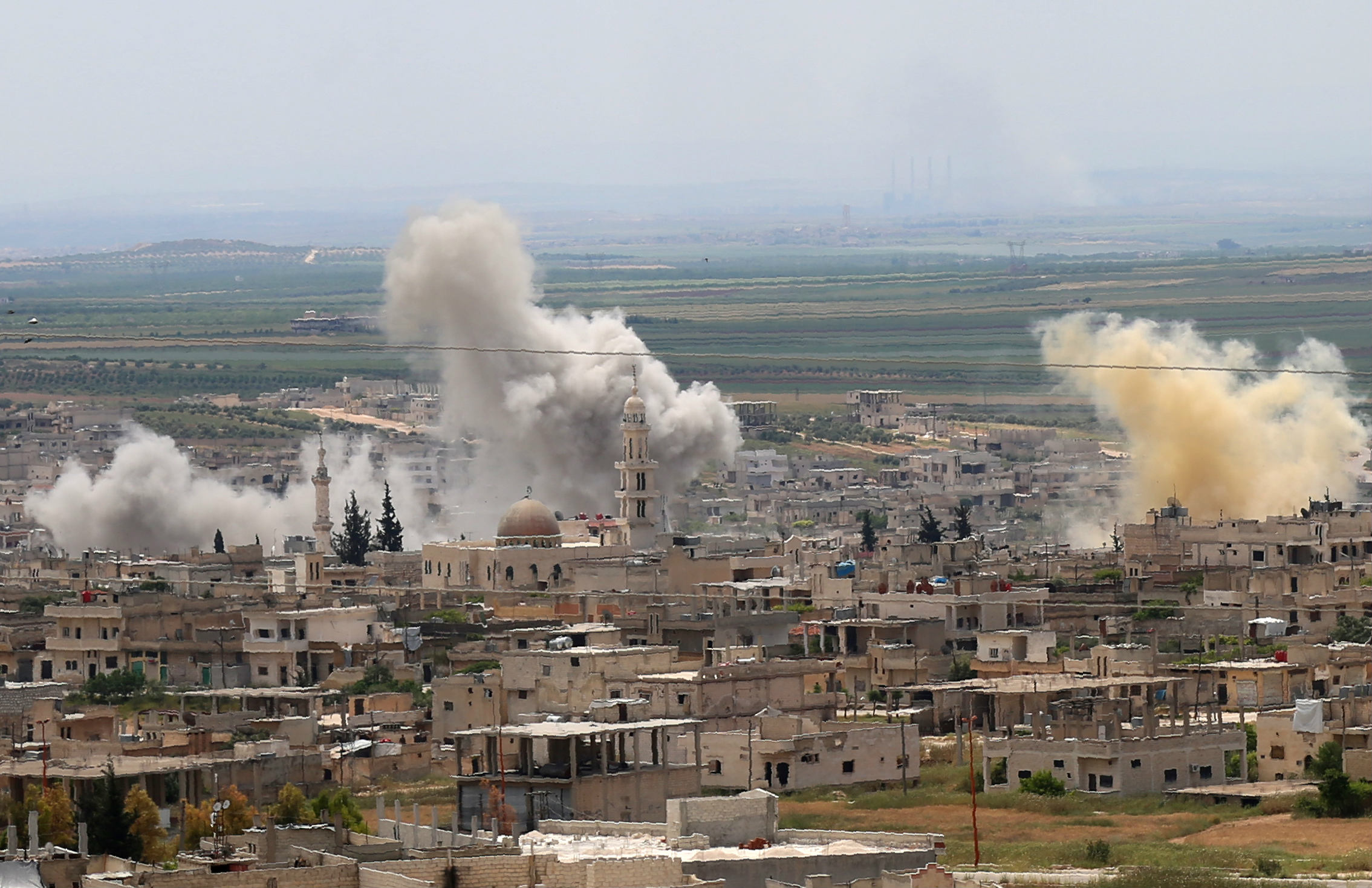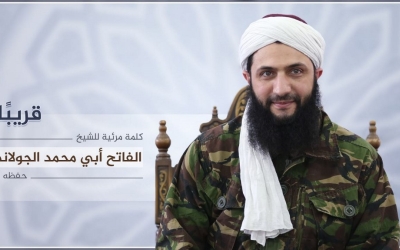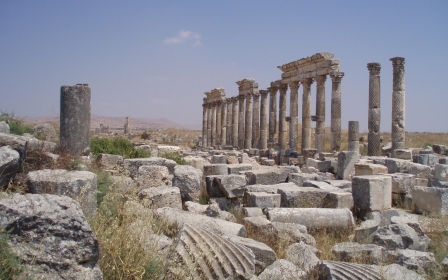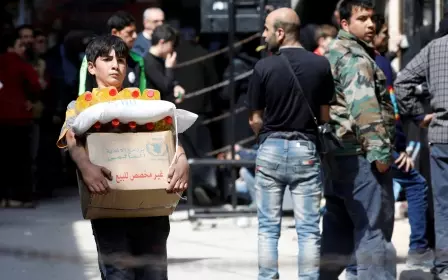Ghost towns and constant bombing: Life along Idlib's frontline
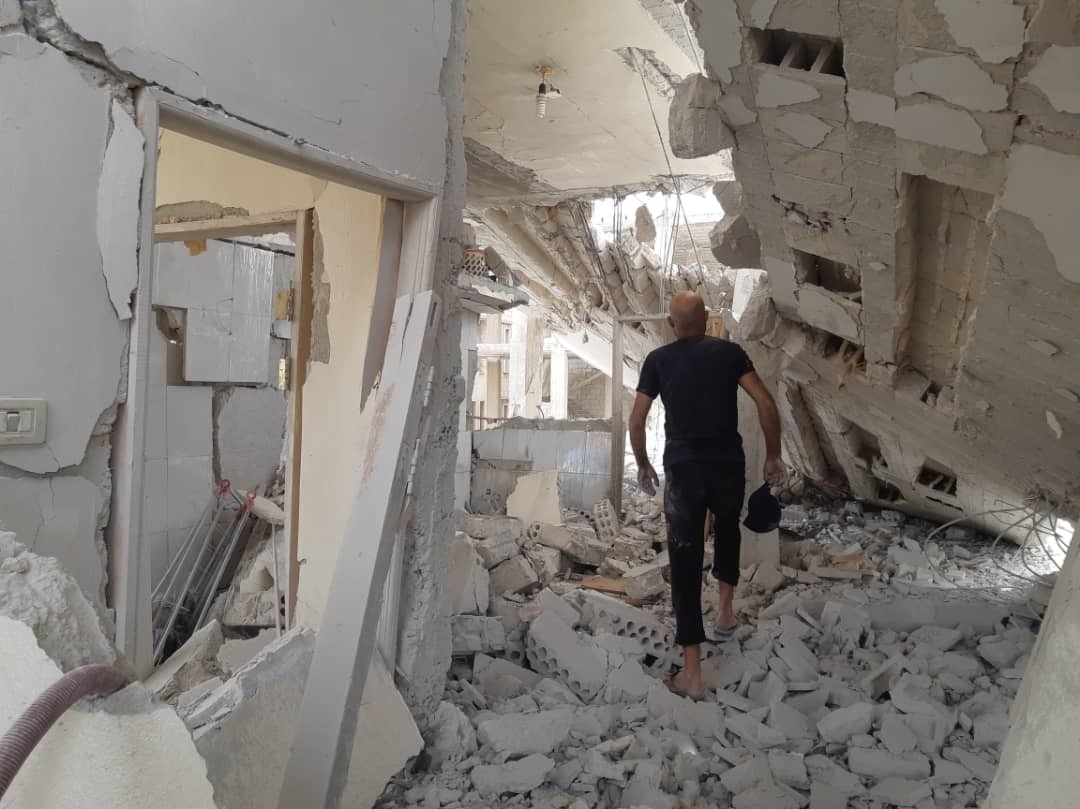
The streets are nearly empty in Anas Diab’s hometown of Khan Sheikhoun.
Shops and apartment blocks lie in crumbled ruins, slabs of concrete are strewn in piles across bombed-out roads now deserted for several months. Few residents remain.
Khan Sheikhoun, a northern Syria town in Idlib province that sits along a major highway stretching from Damascus to Aleppo, has been at the epicenter of a massive pro-government forces bombing offensive for weeks.
Diab’s neighbours have streamed out of the town by the thousands, fleeing a devastating bout of bombardment that has hit homes and hospitals.
By his estimate, and according to others in the town who spoke with Middle East Eye in recent days, around 95 percent of residents have left Khan Sheikhoun.
Diab counts just three of his friends remaining in the town. He only ever visits them at night - and when he can confirm that there aren’t warplanes overhead. There are no remaining bakeries where he can buy bread.
Khan Sheikhoun isn’t alone.
Since February, families in bombed-out southern Idlib and the neighbouring northern Hama province have packed up what belongings they could into their vehicles, hauling themselves and their children north into areas closer to the Syrian-Turkish border, away from the bombardment.
More than half a dozen residents still left behind have told MEE of virtual ghost towns, with few public services and a scarcity of basic food supplies.
At least 37 communities in southern Idlib and northern Hama are now “empty or abandoned,” according to a report published in May by analysis group REACH, with severely limited freedom of movement and access to healthcare for those who remain.
As many as 200,000 people have been displaced north from their hometowns in recent weeks, according to the most recent UN estimate, escaping bombs that have fallen on residential districts and medical facilities.
A citizen journalist and volunteer rescue worker, 23-year-old Diab decided to stay behind in Khan Sheikhoun to continue his work, despite the dangers.
Every day it’s the same story. It’s just continuous bombing'
- Hmeid, Khan Sheikhoun resident
He is among the small number of people who are holding out in southern Idlib and northern Hama.
For them, daily life is eked out in abandoned highway towns and farming villages. Thieves reportedly roam the streets looting empty homes. More than a dozen hospitals have been bombed.
“Every day it’s the same story,” said Hmeid, one of Khan Sheikhoun’s few residents still living in the town. He works as a rescuer with the Syrian Civil Defence organisation, also known as the White Helmets, a job that he said convinced him to stay behind.
“It’s just continuous bombing,” Hmeid said. His wife and 18-month-old son now live more than 50km north in Idlib city, after a bomb hit their next-door neighbour’s house three months ago.
According to Diab, women and children have all fled.
“The people left behind in Khan Sheikhoun now are all men, who are here to protect their homes and neighbourhoods from theft. Either that, or they just don’t want to leave their homes,” he said.
Others, residents said, simply don’t have the money to flee north.
David Swanson, a spokesperson for the United Nations’ humanitarian access agency UNOCHA, calls the situation for those remaining in southern Idlib and northern Hama “particularly worrying”.
“Those who [stayed behind] are often the most vulnerable,” he told MEE.
A last stand in Idlib?
Largely rural, Idlib province is Syria’s last major rebel stronghold, after a series of blitzkrieg military advances in recent years by pro-government forces.
That period has seen devastating siege and bombardment campaigns on former rebel-held areas, such as east Aleppo city and the Damascus suburbs of the Eastern Ghouta, rendering what were once densely populated urban districts into mountains of rubble.
Residents who survived bombing offensives faced an excruciating decision: stay behind under renewed control of the Syrian government - albeit in their own homes - or board the government’s green evacuation buses toward opposition-held territory in the country’s northwest.
Hundreds of thousands of people ended up forcibly displaced to the north, many of them to Idlib province.
The area is now home to an estimated three million Syrians, roughly half of them internally displaced.
Now Idlib - as well as parts of neighbouring rural Aleppo, Hama and Latakia - is facing the prospect of being the site of the next major military showdown between opposition and pro-government forces.
And while Russia’s President Vladimir Putin last month called an all-out offensive on Idlib “inadvisable”, Syrian and allied Russian forces have since April carried out a massive uptick in aerial and ground attacks on the rebel-held enclave.
A deal brokered by Russia and Turkey late last year in the Russian resort city of Sochi held off a massive pro-government assault on northwestern Syria for a time, but now appears to be unravelling as dozens of towns come under fire.
At least 105 people have been killed in the newest offensive since April, according to the UN. Among them are dozens of children.
Syrian state media maintains that the escalation is intended to target “terrorist groups” present in Idlib, where the militant coalition Hay’at Tahrir al-Sham and other armed groups maintain control.
‘I don’t know what I’ll do’
For Syrians living along the country’s now most-heated frontline, the offensive means long summer days punctuated by bombing attacks, with little shelter.
Abu Amjad, a father of three, told MEE a bomb struck his home in Khan Sheikhoun on Wednesday while he and his family were inside.
It was just half an hour before the local mosque’s evening call to prayer would signal the time for the family to break their Ramadan fast for the day and gather for an iftar dinner.
Their iftar never happened.
“We didn’t know what kind of a bomb it was - whether it was an air strike, a shell, or something else,” the 44-year-old said. “But I remember the house collapsing right over our heads.”
He and his wife grabbed their three children, and ran outdoors before the falling concrete could crush them.
“Thank God, we all made it out okay.”
Photos Abu Amjad took the next morning on his phone show his home’s breeze-block walls collapsed over one another, broken mirrors and a formal living room furniture set caked in grey dust, surrounded by debris. Only a few white tiles remain stuck to the wall of what was once his kitchen.
He spent the following day salvaging what possessions he could with the help of a friend, and storing them with the few neighbours who remain on his street. He isn’t sure yet where he will sleep in the coming days.
Abu Amjad’s wife, 16-year-old son and two toddler-aged children both fled Khan Sheikhoun in the hours after the bomb to their home, to a town outside Idlib city where they have relatives.
He stayed behind in Khan Sheikhoun, he says, to “figure out what to do” - whether to salvage the family home, or use what few savings he still has from his internet cafe business and flee north.
“I don’t have any money to pay rent on a home in another town. I don’t know yet what I’ll do, whether I’ll stay with neighbours or something else,” he said.
Out of fear of similar bombings, few residents are staying in second- or third-storey flats these days, Diab, the photojournalist from Khan Sheikhoun, told MEE.
“They’re just staying in shelters, or on the ground floors. We could be hit with bombs at any moment.”
When he buys staple items such as bread, he has to leave Khan Sheikhoun. The shelves in his own town are nearly empty, Diab said.
He goes by night, with his headlights off, to avoid detection. “The roads are simply too dangerous,” the 23-year-old said.
Diab rarely visits friends. Few of them remain, anyway - most have left town for safety. His own family left several months ago.
That’s despite the current month of Ramadan, normally a time of celebration and gathering with friends and family.
There is little to remain cheerful about in Khan Sheikhoun, according to Anas.
“Life now - it’s becoming just fear and anxiety.”
This article is available in French on Middle East Eye French edition.
Middle East Eye delivers independent and unrivalled coverage and analysis of the Middle East, North Africa and beyond. To learn more about republishing this content and the associated fees, please fill out this form. More about MEE can be found here.


